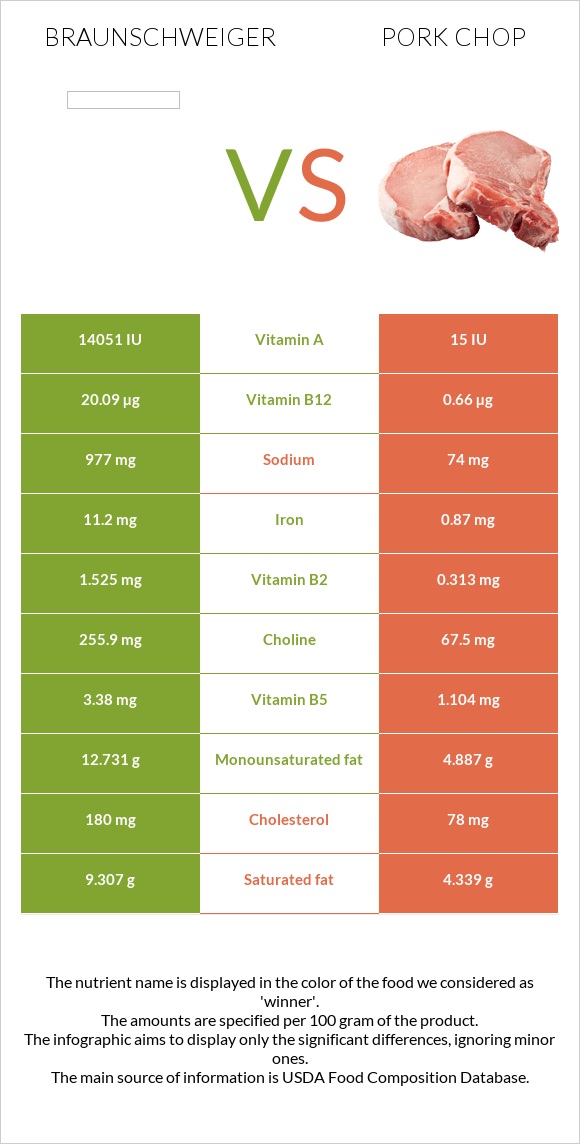Braunschweiger vs. Pork chop — In-Depth Nutrition Comparison
Compare
The main differences between braunschweiger and pork chop
- Pork chop contains less vitamin B12, vitamin A, iron, vitamin B2, vitamin B5, selenium, and choline than braunschweiger.
- Daily need coverage for vitamin B12 for braunschweiger is 810% higher.
- Pork chop has 937 times less vitamin A than braunschweiger. Braunschweiger has 14051 IU of vitamin A, while pork chop has 15 IU.
- Pork chop is lower in sodium.
Food types used in this article are Braunschweiger (a liver sausage), pork and Pork, fresh, loin, blade (chops), bone-in, separable lean, and fat, cooked, broiled.
Infographic

Infographic link
Mineral Comparison
Mineral comparison score is based on the number of minerals by which one or the other food is richer. The "coverage" charts below show how much of the daily needs can be covered by 300 grams of the food.
| Contains more IronIron | +1187.4% |
| Contains more CopperCopper | +128.6% |
| Contains more ManganeseManganese | +1450% |
| Contains more SeleniumSelenium | +59.3% |
| Contains more MagnesiumMagnesium | +81.8% |
| Contains more CalciumCalcium | +522.2% |
| Contains more PotassiumPotassium | +58.3% |
| Contains more ZincZinc | +12.1% |
| Contains more PhosphorusPhosphorus | +43.5% |
| Contains less SodiumSodium | -92.4% |
Vitamin Comparison
Vitamin comparison score is based on the number of vitamins by which one or the other food is richer. The "coverage" charts below show how much of the daily needs can be covered by 300 grams of the food.
| Contains more Vitamin AVitamin A | +105400% |
| Contains more Vitamin EVitamin E | +66.7% |
| Contains more Vitamin DVitamin D | +20% |
| Contains more Vitamin B2Vitamin B2 | +387.2% |
| Contains more Vitamin B5Vitamin B5 | +206.2% |
| Contains more Vitamin B12Vitamin B12 | +2943.9% |
| Contains more Vitamin KVitamin K | +∞% |
| Contains more FolateFolate | +∞% |
| Contains more Vitamin B1Vitamin B1 | +96.8% |
| Contains more Vitamin B6Vitamin B6 | +48.2% |
All nutrients comparison - raw data values
| Nutrient |  |
 |
DV% diff. |
| Vitamin B12 | 20.09µg | 0.66µg | 810% |
| Vitamin A | 4220µg | 4µg | 468% |
| Iron | 11.2mg | 0.87mg | 129% |
| Vitamin B2 | 1.525mg | 0.313mg | 93% |
| Vitamin B5 | 3.38mg | 1.104mg | 46% |
| Sodium | 977mg | 74mg | 39% |
| Selenium | 58µg | 36.4µg | 39% |
| Cholesterol | 180mg | 78mg | 34% |
| Choline | 255.9mg | 67.5mg | 34% |
| Saturated fat | 9.307g | 4.339g | 23% |
| Fats | 28.5g | 14.35g | 22% |
| Vitamin B1 | 0.249mg | 0.49mg | 20% |
| Monounsaturated fat | 12.731g | 4.887g | 20% |
| Protein | 14.5g | 23.72g | 18% |
| Copper | 0.24mg | 0.105mg | 15% |
| Vitamin B6 | 0.33mg | 0.489mg | 12% |
| Folate | 44µg | 0µg | 11% |
| Phosphorus | 168mg | 241mg | 10% |
| Polyunsaturated fat | 3.193g | 1.894g | 9% |
| Manganese | 0.155mg | 0.01mg | 6% |
| Calories | 327kcal | 231kcal | 5% |
| Calcium | 9mg | 56mg | 5% |
| Potassium | 199mg | 315mg | 3% |
| Zinc | 2.81mg | 3.15mg | 3% |
| Vitamin B3 | 8.368mg | 7.927mg | 3% |
| Magnesium | 11mg | 20mg | 2% |
| Carbs | 3.1g | 0g | 1% |
| Vitamin D | 48 IU | 40 IU | 1% |
| Vitamin E | 0.35mg | 0.21mg | 1% |
| Vitamin D | 1.2µg | 1µg | 1% |
| Vitamin K | 1.6µg | 0µg | 1% |
| Net carbs | 3.1g | 0g | N/A |
| Trans fat | 0.066g | N/A | |
| Tryptophan | 0.145mg | 0.282mg | 0% |
| Threonine | 0.534mg | 1.043mg | 0% |
| Isoleucine | 0.484mg | 1.123mg | 0% |
| Leucine | 1.032mg | 1.952mg | 0% |
| Lysine | 0.909mg | 2.109mg | 0% |
| Methionine | 0.311mg | 0.65mg | 0% |
| Phenylalanine | 0.553mg | 0.985mg | 0% |
| Valine | 0.616mg | 1.2mg | 0% |
| Histidine | 0.32mg | 0.965mg | 0% |
| Omega-3 - DHA | 0g | 0.001g | N/A |
| Omega-3 - ALA | 0.065g | N/A | |
| Omega-3 - DPA | 0g | 0.011g | N/A |
| Omega-6 - Gamma-linoleic acid | 0.003g | N/A | |
| Omega-6 - Eicosadienoic acid | 0.065g | N/A | |
| Omega-6 - Linoleic acid | 0.922g | N/A |
Macronutrient Comparison
Macronutrient breakdown side-by-side comparison
Protein:
14.5 g
Fats:
28.5 g
Carbs:
3.1 g
Water:
50.6 g
Other:
3.3 g
Protein:
23.72 g
Fats:
14.35 g
Carbs:
0 g
Water:
61.45 g
Other:
0.48 g
| Contains more FatsFats | +98.6% |
| Contains more CarbsCarbs | +∞% |
| Contains more OtherOther | +587.5% |
| Contains more ProteinProtein | +63.6% |
| Contains more WaterWater | +21.4% |
Fat Type Comparison
Fat type breakdown side-by-side comparison
Saturated fat:
Sat. Fat
9.307 g
Monounsaturated fat:
Mono. Fat
12.731 g
Polyunsaturated fat:
Poly. Fat
3.193 g
Saturated fat:
Sat. Fat
4.339 g
Monounsaturated fat:
Mono. Fat
4.887 g
Polyunsaturated fat:
Poly. Fat
1.894 g
| Contains more Mono. FatMonounsaturated fat | +160.5% |
| Contains more Poly. FatPolyunsaturated fat | +68.6% |
| Contains less Sat. FatSaturated fat | -53.4% |





